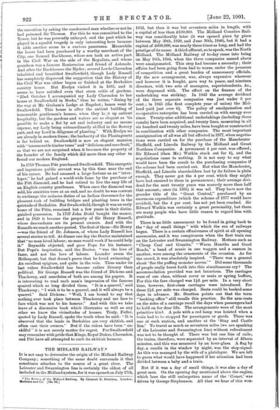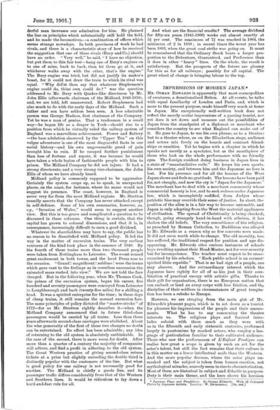THE MIDLAND RAILWAY.*
IT is not easy to determine the origin of the Midland Railway Company; something of the same doubt surrounds it that sometimes attaches to the source of a great river. The Leicester and Swannington line is certainly the oldest of all included in the Midland system, for it was opened on July 17th, • Th. Indory of tat Midland Railway. By Clement E. Strottort.. London: Illethsen and Co. [128. fid.] 1832, but then it was but seventeen miles in length, with a capital of less than £100,000. The Midland Counties Rail-
way was considerably later (it was opened piece by piece between May 30th, 1839, and June 30th, 1840), but it had a capital of 2600,000, was nearly three times as long, and had the
prestige of its name. A third affluent, so to speak, was the North Midland. The Midland Railway of to-day came into being on May 10th, 1844, when the three companies named above were amalgamated. This step had become a necessity ; their affairs had been going from bad to worse, under the pressure of competition and a great burden of unnecessary officials. By the new arrangement, war, always expensive wherever and however it is fought, gave way to peace, and nineteen directors, With two sets of managers, superintendents, Ac., were dispensed with. The effect on the finance of the undertaking was striking. In 1843 the average dividend og the three separate companies was just under 3 per cent. ; in 1845 (the first complete year of union) the Mid- land paid just over 6. The policy of amalgamation and co-operative enterprise has been carried on with energy ever since. Twenty-nine additional undertakings (including three canals) have been acquired, and twenty lines, measuring in all six hundred and twenty miles, have been bought or constructed in combination with other companies. The most important amalgamation of all was all but effected in 1877, when negotia- tions were carried on for the purchase of the Manchester Sheffield, and Lincoln Railway by the Midland and Great Northern Companies. A permanent 4 per cent. was offered ; Sir Edward (then Mr.) Watkin stuck out for 4, and the negotiations came to nothing. It is not easy to say what would have• been the result to the purchasing companies if the scheme had been carried out. But what the Manchester. Sheffield, and Lincoln shareholders lost by its failure is plain enough. They never got the 4 per cent. which they might have had ensured to them in permanence; their average divi- dend for the next twenty years was scarcely more than half that amount; once (in 1895) it was nil. They have now the grander title of the "Great Central," purchased by an enormous expenditure (which the scheme of 1877 would have avoided), but the 4 per cent, has not yet been reached. Sir Edward Watkin was certainly a great personality, but there are many people who have little reason to regard him with gratitude.
There is no little amusement to be found in going back to the "day of small things" with which the era of railways began. There is a certain effusiveness of spirit at all opening ceremonies, and it was conspicuous when the first train ran on the Leicester and Swannington Railway. Mottoes such as "Cheap Coal and Granite," "Warm Hearths and Good Roads," a band of music in one waggon and a cannon in another, were among the ornaments of the occasion. As for the crowd, it was absolutely inspired. "There was a general shout See the puffing monster moves.' " Did some thousands of people really burst forth into this simultaneous cry ? The accommodation provided was not luxurious. The carriages were of one class, without cover or seats or spring buffers., For this the fare charged was lid. per mile. In a very short time, however, first-class carriages were introduced. For these 20. per mile was charged. Seats could be booked some days in advance. Mr. Stretton points out that the term "booking office" still recalls this practice. So the arm-iests on the sides of a carriage recall the days when passengers had to hold on for dear life. The arrangements were of the most primitive kind. A pole with a red lamp was hoisted when a train had to be stopped for passengers or goods. There was one at each station, and another at the Stag and Castle Inn.' To travel as much as seventeen miles (we are speaking of the Leicester and Swannington line) without refreshment was not to be thought of. There was but one line of rails; the trains, therefore, were separated by an interval of fifteen minutes, and this was measured by an hour-glass. A flag by day, a candle in the window by night, was the stop-signal. As this was managed by the wife of a platelayer. We are left to guess what would have happened if her attention had been divided between a baby and a train.
But if it was a day of small things, it was also a day of great men. On the opening day mentioned above the engine, which bore the still unforgotten name of the Comet,' was driven by George Stephenson. All 4hat we hear of this won-
derful man increases our admiration for him. He planned the line on principles which substantially still hold the field, and he made the locomotives,—a combination of offices which seems strange nowadays. In both provinces of work he had rivals, and there is a characteristic story of how he received the suggestion that one of these rivals (Bury and Co.) should have an order. "Very well," he said, "I have no objection, but put them to this fair test—hang one of Bury's engines on to one of mine, back to back, then let them go at it, and whichever walks away with the other, that's the engine." The Bury engine was tried, but did not justify its maker's boast, for it could not draw the train to which its rival was equal. "Why did'st thou say that whatever Stephenson's engine could do, thine own could do F" was the question addressed to Mr. Bury with Quaker-like directness by Mr. John Ellis (afterwards chairman of the Midland, 1849-1858), and, we are told, left unanswered. Robert Stephenson had also much to do with the early days of the Midland. Such a father and son have seldom been seen. A less admirable person was George Hudson, first chairman of the Company. Yet he was a man of genius. That a tradesman in a small way—he began life as a draper in York—should rise to a position from which he virtually ruled the railway system of England was a marvellous achievement. Power and flattery —the base adulation showered by the "Upper Ten" on this vulgar adventurer is one of the most disgraceful facts in our social history—and his own ungovernable greed of gain brought him to ruin. If he escaped further punishment than loss of fortune and repute, it was because ' he would have taken a whole legion of fashionable people with him to prison. The Midland Company he did not injure. It had a strong directorate; and a very strong vice-chairman, the John Ellis of whom we have already heard.
Midland policy is commonly supposed to be aggressive. Certainly the system crops up, so to speak, in unexpected places, on the coast, for instance, where its name would not suggest its presence. The coast, however, in England is never very far from the most Midland regions. Mr. Stratton roundly asserts that the Company has never attacked except in self-defence. Some of his own summaries, however, as, e,g., "Invasion of Wales," would seem to suggest another view. But this is too grave and complicated a question to be discussed in these columns. One thing is certain, that the capital has grown to colossal dimensions, and that it is, in consequence, increasingly difficult to earn a good dividend.
. Whatever its shareholders may have to say, the public has no reason to be dissatisfied with Midland policy. It led the way in the matter of excursion trains. The very earliest ventures of the kind took place in the summer of 1840. By the fourth of these trains more than two thousand people were taken from Nottingham to Leicester. The event roused great excitement in both towns, and the local Press rose to the occasion. " Grand ! magnificent! sublime ! were the terms which gave vent to the feelings as in countless succession the animated mass rushed into view." We are not told the fare aharged. But in the following year, when Mr. Thomas Cook, the prince of the excursion system, began his career, five hundred and seventy passengers were conveyed from Leicester to Loughborough and back (twenty-five miles) for a shilling a head. It was a spirited enterprise for the time ; in these days of cheap trains, it still remains the normal excursion fare. The same principles of policy dictated the " master-stroke " of 1872—for so Mr. Stretton rightly describes it—when the Midland Company announced that in future third-class passengers would be carried by all trains. Less than three years afterwards second-class carriages were abolished. About the wise generosity of the first of these two changes no doubt can be entertained. Its effect has been admirable; any idea of returning to the old system is absolutely unthinkable. In the case of the second, there is more room for doubt. After more than a quarter of a century the majority of companies Still adhere, and find a profit in adhering, to the old system. The Great Western practice of giving second-class return tickets at a price but slightly exceeding the double third is distinctly popular with the customers of the line. But what is good policy for one railway is not necessarily good for another. The Midland is chiefly a goods line, and its passenger traffic differs considerably from that of the Western and Southern line& It would be ridiculous to lay down a hard-and-fast rule for all. And what are the financial results ? The average dividend for fifty-six years (1845-1900) works out almost exactly at 5g per cent. The maximum of n was reached in 1864, the minimum of 2 in 1850; in recent times the worst year has been 1893, when the great coal strike was going on. It must be remembered that the Ordinary Stock bears a larger pro- portion to the Debenture, Guaranteed, and Preference than it does in other " heavy " lines. On the whole, the result is satisfactory. But the prospects of the future are gloomy for this as for all railways ; possibly for all capital. The great wheel of change is bringing labour to the top.











































 Previous page
Previous page